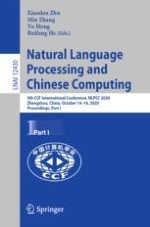2020 | OriginalPaper | Buchkapitel
Robust Spoken Language Understanding with RL-Based Value Error Recovery
verfasst von : Chen Liu, Su Zhu, Lu Chen, Kai Yu
Erschienen in: Natural Language Processing and Chinese Computing
Aktivieren Sie unsere intelligente Suche, um passende Fachinhalte oder Patente zu finden.
Wählen Sie Textabschnitte aus um mit Künstlicher Intelligenz passenden Patente zu finden. powered by
Markieren Sie Textabschnitte, um KI-gestützt weitere passende Inhalte zu finden. powered by
